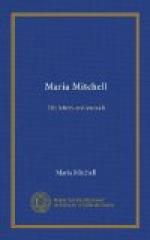“Sept. 22, 1854. On the evening of the 18th, while ‘sweeping,’ there came into the field the two nebulae in Ursa Major, which I have known for many a year, but which to my surprise now appeared to be three. The upper one, as seen from an inverting telescope, appeared double-headed, like one near the Dolphin, but much more decided than that, the space between the two heads being very plainly discernible and subtending a decided angle. The bright part of this object was clearly the old nebula—but what was the appendage? Had the nebula suddenly changed? Was it a comet, or was it merely a very fine night? Father decided at once for the comet; I hesitated, with my usual cowardice, and forbade his giving it a notice in the newspaper.
“I watched it from 8.30 to 11.30 almost without cessation, and was quite sure at 11.30 that its position had changed with regard to the neighboring stars. I counted its distance from the known nebula several times, but the whole affair was difficult, for there were flying clouds, and sometimes the nebula and comet were too indistinct to be definitely seen.
“The 19th was cloudy and the 20th the same, with the variety of occasional breaks, through which I saw the nebula, but not the comet.
“On the 21st came a circular, and behold Mr. Van Arsdale had seen it on the 13th, but had not been sure of it until the 15th, on account of the clouds.
“I was too well pleased with having really made the discovery to care because I was not first.
“Let the Dutchman have the reward of his sturdier frame and steadier nerves!
“Especially could I be a Christian because the 13th was cloudy, and more especially because I dreaded the responsibility of making the computations, nolens volens, which I must have done to be able to call it mine....
“I made observations for three hours last night, and am almost ill to-day from fatigue; still I have worked all day, trying to reduce the places, and mean to work hard again to-night.
“Sept. 25, 1854. I began to recompute for the comet, with observations of Cambridge and Washington, to-day. I have had a fit of despondency in consequence of being obliged to renounce my own observations as too rough for use. The best that can be said of my life so far is that it has been industrious, and the best that can be said of me is that I have not pretended to what I was not.
“October 10. As soon as I had run through the computations roughly for the comet, so as to make up my mind that by my own observations (which were very wrong) the Perihelion was passed, and nothing more to be hoped for from observations, I seized upon a pleasant day and went to the Cape for an excursion. We went to Yarmouth, Sandwich, and Plymouth, enjoying the novelty of the new car-route. It really seemed like railway travelling on our own island, so much sand and so flat a country.
“The little towns, too, seemed quaint and odd, and the old gray cottages looked as if they belonged to the last century, and were waked from a long nap by the railway whistle.




